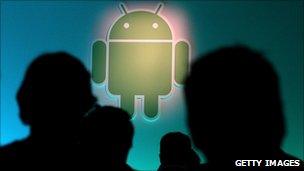Is 'open' killing the Android?
- Published

Google Android's paid app sales are gloomy, and some developers are finding this frustrating
When Google decided to get into the smartphone business, it brought with it a philosophy.
Its Android devices would be everything that the iPhone was not.
Where Apple offered a set menu - one or two handsets at a take-it-or-leave-it price - Google was laying out a buffet.
Manufacturers could use the new operating system for free.
In return they would create scores of phones for every section of the market - high powered and pricey, cheap and cheerful.
But Android's real selling point would be the apps.
Here too, the policy was one of openness.
Apple ruled its App store with an iron fist, vetting every submission and rejecting those that contravened its rules.
There would be no bouncers on the door of the Android Market.
Anyone who had written an app could upload it. Quality products would prosper; the chaff would be lost in cyberspace.
At first, users and app developers welcomed the free-and-easy approach.
However, some have begun to question if Google's policy of app glasnost is the best way to manage the Market.
Google's growth
There is no doubt about the success of the basic Android platform. Three years after its launch, hardware sales are booming.
According to research by Kantar WorldPanel Comtech, Android now accounts for 38% of the UK smartphone market, compared to 23% for Apple's devices.
Stateside, Android is faring even better, holding a 54.7% share, while iOS has 27.2%.
Last month, Google revealed that 350,000 Android phones are being activated every day.
Yet sales of Android apps remain relatively poor.
IHS Screen Digest estimates that £1.1billion of revenue flowed through Apple's App store last year.
Android Market managed just £62m. The figure was lower than both Blackberry App World (£100m) and Nokia's Ovi store (£64m).
Research predicts massive improvements for Android by this time next year, but it is still expected to lag far behind iOS.
Disgruntled developers
For many application developers, the problem lies with Android Market, the main download portal for apps.
"People complain about Apple where you have restrictions and it takes a while for things to be reviewed," said Chris McClelland, director of Ecliptic Labs, a mobile app developer based in Belfast.
"I think on one hand it's quite a good thing - one focused source, and you get feedback that's very useful for your app. It's quality control."

Amazon entered the app race earlier this year with much fanfare and exclusive rights to Angry Birds Rio
The Android Market needs to become that focused source, he says.
"Android is very popular with developers. It's got a lower barrier to entry, easier learning curve, and excellent tools, but app developers find making money on the Android platform more difficult."
Another criticism is the lack of quality control on Android Market.
While many developers welcome an alternative to Apple's walled garden, Google's offering, they say, has become over-run with weeds.
"There's a lot of apps on the Marketplace that are either copycats or pirates or scams," said Chris McClelland.
Security firm Symantec, in its 2011 Internet Security Threat Report, external, warned that Android was at particular risk from malware embedded in apps.
It found that at least six varieties of malicious software were already being circulated.
There are also more benign threats to Android's success.
Michael Heller, from Android blog Androinica, external, is critical of the way that apps are catalogued and promoted.
"One of the most ridiculous things about the Android Marketplace is that the search feature is terrible.
"I mean, this is Google! You have to find out about the apps somewhere else and then go get them from the Android Marketplace," he said.
'Like Autotune'
Users' frustrations with the Market have not gone unnoticed by Google's rivals
Amazon, Cisco, Barnes and Noble, Verizon, GetJar, Andspot and OnlyAndroid are just a few of the tech companies hoping to improve the experience with their own Android app stores.
Unlike Apple's retail monopoly on apps, Android's open setup means anyone can set up shop.
"I feel like right now we're in one of those annoying periods like when Autotune got big, where everybody started using it," said Mr Heller, referring to the popular voice correction software, widely used in the music industry.
"Everybody is putting out an app store.

Barnes and Noble launched their own app store to complement their Nook Color e-reader
"There are all these different players that want to create their own store but eventually it's not going to be a sustainable model.
"If all of these app stores are populated with all of the same apps that's kind of a waste for developers, isn't it?"
Amazon's store, named - despite the best efforts of Apple's legal team - the Appstore, launched in April.
It is not available on all Android devices due to individual carriers' rules on adding apps from sources other than the Android Market, but is likely to become a major player in the paid-app market.
One notable peculiarity of the Appstore is that, although its very existence is only possible because of Android's open policy, the store itself is a closed system.
Instead of letting everything and anything on, Amazon curates and monitors each app and developers must adhere to set standards in order to get their work in - just like the Apple's App Store.
"The Amazon store solves some of the problems that the standard marketplace has," said Mr McClelland. "It makes things a bit more exposed and helps search."
While a wider choice of app stores gives Android users more choice about the kind of environment they want to shop in, it may also make life harder for developers.
"One of the biggest problems with Blackberry was that there were fragmented app stores, and I think the same problem's going to happen with Android," said Chris McClelland.
"I think having to submit apps to different stores, it just becomes another problem."
He also worries that with more and more stores appearing, it will be hard for one company - even a giant like Amazon - to become the definitive source for all the best apps.
Ideas grab
Which is why Google will eventually win, according to Mr Heller.
"Some of them may do certain things pretty well but eventually Google just takes the good ideas and fold them into their own product as best they can.
"Even if Amazon gets huge, and everyone is using it, if Google sorts out their store... what's the point of using Amazon?
"It's an Android phone, it's a Google phone. You're already in this ecosystem, why would you go somewhere else if the product is just as good?"
But there may be money to be made in niche markets - especially corporate.
"Cisco alone has a chance to become fairly big because enterprise is something that neither Android nor iPhone really had figured out quite yet.
"They're still very consumer oriented devices," said Mr Heller.
It is predicted that the appetite for paid apps will increase massively in the very near future, surpassing $8bn (£4.8bn) in the next three years.
But just how much of that lucrative pie will come from Android remains to be seen, and it could be make or break for Google's open mobile ambitions.
- Published22 March 2011
- Published26 April 2011
- Published3 March 2011